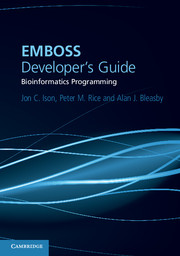Book contents
- Frontmatter
- Contents
- Acknowledgements
- Preface
- Conventions
- Welcome to the EMBOSS Developer’s Guide
- 1 Getting started
- 2 Your first EMBOSS application
- 3 Software development under EMBOSS
- 4 ACD file development
- 5 C programming
- 6 Programming with AJAX
- 7 Quality assurance
- 8 Application documentation standards
- 9 A complete application: seqret
- 10 Incorporating third-party applications
- Appendix A ACD syntax reference
- Appendix B C programming libraries
- Appendix C C coding standards
- Appendix D Code documentation standards
- Appendix E Resources
- Index
Preface
Published online by Cambridge University Press: 05 December 2011
- Frontmatter
- Contents
- Acknowledgements
- Preface
- Conventions
- Welcome to the EMBOSS Developer’s Guide
- 1 Getting started
- 2 Your first EMBOSS application
- 3 Software development under EMBOSS
- 4 ACD file development
- 5 C programming
- 6 Programming with AJAX
- 7 Quality assurance
- 8 Application documentation standards
- 9 A complete application: seqret
- 10 Incorporating third-party applications
- Appendix A ACD syntax reference
- Appendix B C programming libraries
- Appendix C C coding standards
- Appendix D Code documentation standards
- Appendix E Resources
- Index
Summary
Introduction to EMBOSS
The European Molecular Biology Open Software Suite (EMBOSS) is a high-quality, well-documented package of open source software tools for molecular biology. It includes over 200 applications for molecular sequence analysis and other common tasks in bioinformatics. It integrates the core applications with a range of popular third-party software packages under a consistent and powerful command line interface. The software has many useful features; for example, it automatically copes with data in a variety of formats and allows for transparent retrieval of sequence data from the web.
EMBOSS includes extensive C programming libraries with a clean and consistent API. There is much useful inbuilt functionality, for example the handling of the command line and common file formats, making it a powerful and convenient platform to develop and release bioinformatics programs. True to the spirit of open source, EMBOSS is free of charge to all and the code is licensed for use by everyone under the GNU General Public Licenses (GPL and LGPL). No one individual or institute ‘owns’ the code, or ever will. Under the terms of the licenses, it can be downloaded via the internet, copied, customised and passed on, so long as these same freedoms are preserved for others. Contributions are strongly encouraged!
- Type
- Chapter
- Information
- EMBOSS Developer's GuideBioinformatics Programming, pp. xxiii - xxvPublisher: Cambridge University PressPrint publication year: 2011



